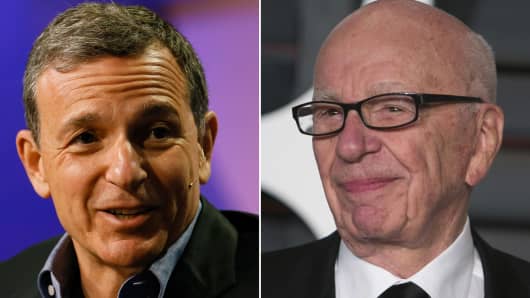The front-runner to buy 22 regional sports TV networks from Disney is the same company that sold them in the first place.
“New Fox,” the company that will remain after Rupert Murdoch sells $71.3 billion worth of 21st Century Fox assets to Disney, is the leading contender to buy back the RSNs it “sold” to Disney as part of the larger transaction, according to people familiar with the matter. Those networks broadcast the games of 44 professional teams from Major League Baseball, the National Basketball Association and the National Hockey League
Formal offers haven’t come in yet. As Sports Business Daily reported, Disney only recently sent out its bid book to prospective buyers. News that Fox was considering buying back the channels was previously reported by The Information.
But people familiar with the process, who asked not to be named because the negotiations are private, say New Fox is the most serious buyer for all the networks. That’s a cleaner outcome for Disney than selling the networks piecemeal, which would bring in smaller buyers and private equity firms.
Disney is a motivated seller because it can’t get its larger deal for Fox done without divesting the networks. The Department of Justice forced Disney, which owns ESPN, to sell the networks to alleviate concerns about too much sports programming power in the hands of one company. In fact, the networks might never even change hands, depending on when Disney’s larger deal of Fox closes.
Winning back the sports networks would be a coup for Rupert Murdoch, who could get the RSNs at a lower price than the value at which he sold them to Disney — a price that was driven up nearly $20 billion by Comcast’s rival bid for the bundle of Fox assets. There may also be beneficial tax benefits to Murdoch, related to tax-deductible amortization, one of the people said.
A declining asset that’s worth more to Fox than anyone else
There are several ironies here.
First, while the DOJ forced Disney to sell the RSNs to get the larger deal done, the networks were never a crown jewel asset for Fox, Disney or Comcast. Fox was willing to sell them (and did). Disney took them because it wanted other assets from Fox (its studio, its stake in Hulu, Star India).
Meanwhile, Comcast saw the RSNs as an albatross and was equally willing to divest them, according to people familiar with the companies’ thinking.
Regional sports networks used to be huge value-adds for the cable industry. They carry exclusive broadcasting rights to local games, which come with devoted fan bases. About a decade ago, the networks began to hike carriage fees, knowing cable providers would agree to the higher prices rather than risk alienating customers by blacking out the networks. That led to a steady rise in the cost of cable for consumers. Residents of markets like New York or Los Angeles, which have multiple teams and a handful of RSNs, were paying fees up to $10 a month (baked into their monthly cable bill) whether or not they were watching the games.
In recent years, pay-TV providers, which have seen millions of customers cut the cord, have started to see RSNs differently. Providers have pushed to tier them onto packages that appeal just to sports fans while keeping costs lower for everyone else. This has decreased the value of the networks, which are no longer automatically part of everyone’s basic cable packages.
Several pay-TV providers have dropped regional sports networks, refusing to pay their high programming fees. For instance, SportsNet LA, which broadcasts L.A. Dodgers games, which hasn’t been carried by DirecTV for five straight years.
If Fox ends up with the sports networks again, part of the reason will be that no other large pay-TV distributor — Charter, AT&T, Comcast or Dish — saw value in owning the networks. While Sinclair Broadcast Group CEO Chris Ripley has discussed making an offer for the networks with private equity support, it would need quite a bit of help. Sinclair’s market capitalization is just $2.8 billion. The regional sports networks were valued at more than $20 billion, according to a Guggenheim Securities analysis.
It’s still unclear how much New Fox is willing to spend on the networks — or what Disney values them at. What is clear is that Disney needs to sell them.
[“source=cnbc”]



